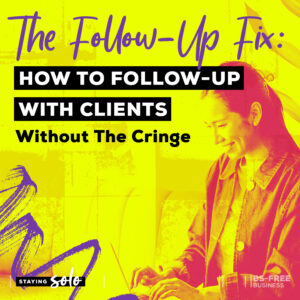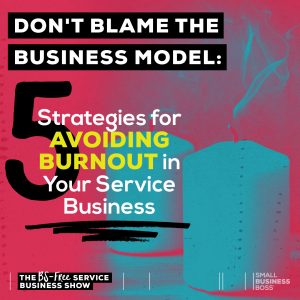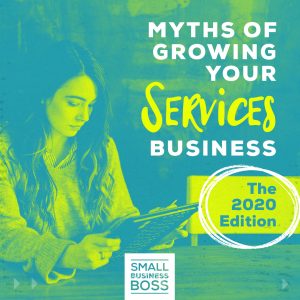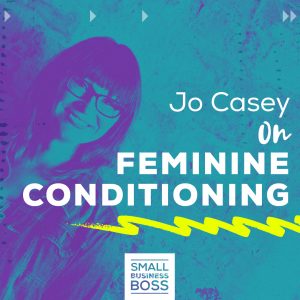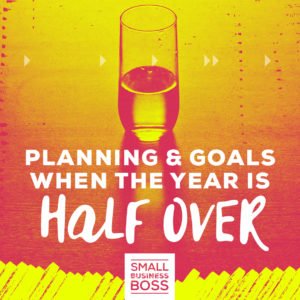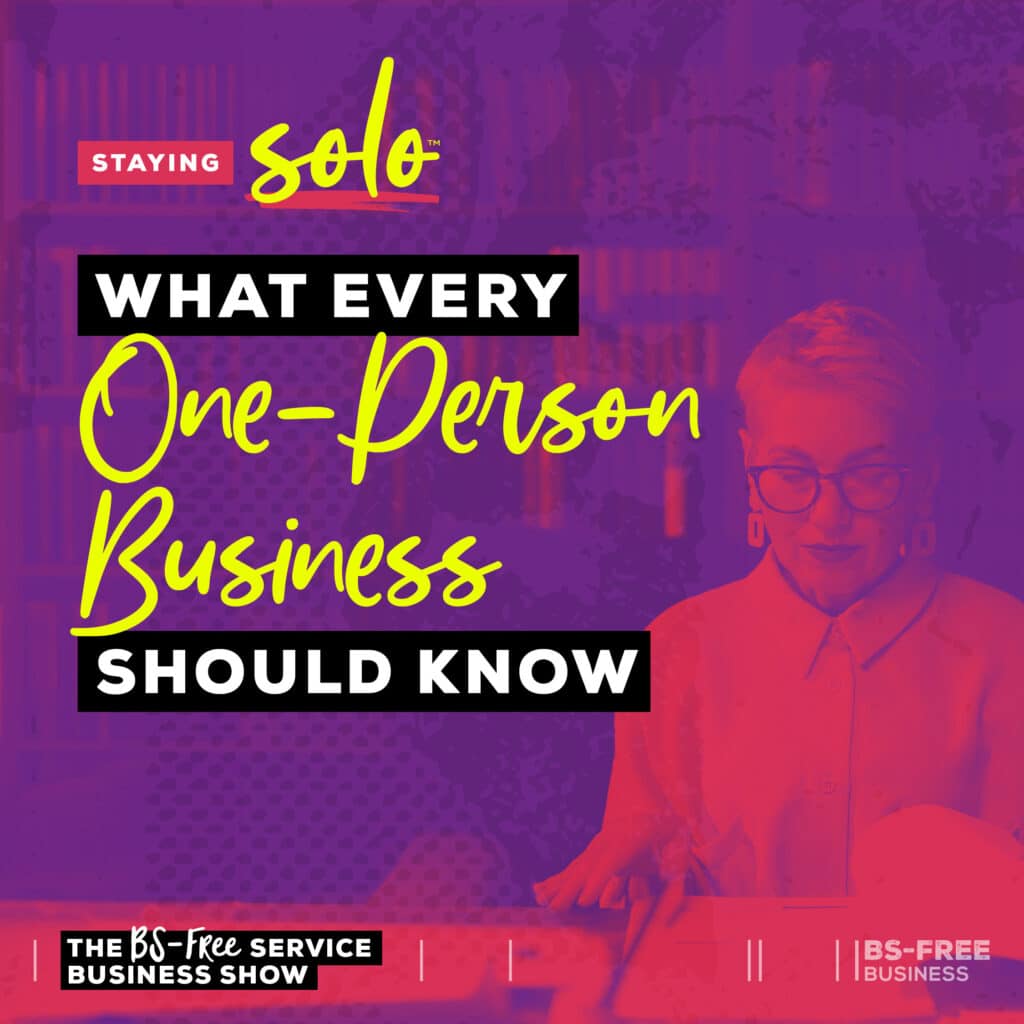
Search the site:
Staying Solo: What Every One-Person Business Should Know
Do you feel like you’re on a hamster wheel with your business? No matter how much you work, your work is never done, and you’re questioning if it will ever be enough.
What if I told you the key to having a sustainable business as a solo business owner is about doing less better? Today, I’m flipping the script on your default “hustle hard” programming and sharing what really matters when growing a service business as a solopreneur.
I guarantee at least one thing in this episode will have you thinking differently about how you run your business.
One of the biggest challenges I faced as a solo service business owner was the idea that I was never doing enough to “grow” the business, and what I was doing wasn’t good enough.
I was confident in my work, had strong relationships, and received referrals from happy clients, yet every so often, I’d be struck with this sinking feeling that my success was a fluke or that I was one step away from having to get a job.
Sometimes it was fear. Sometimes it was my brain being a chaos gremlin. But most of the time, I thought that my business needed to be harder than it was and that I needed to try to do more constantly.
I see this daily with my clients, so I wanted to discuss it. You’re doing a good job—likely so much better than you think.
There’s an art to staying solo as a business owner that starts with understanding that it’s not about doing more; it’s about doing the right things. However, this is much easier said than done, right?
Thanks to cultural norms and societal expectations, we’re conditioned to believe that working and doing more gives us worth. These beliefs are reinforced through our education, family expectations, and even popular media telling us that hustling hard is the path to success.
In entrepreneurial or online business circles, this is intensified by how success is defined by how much money you make, how famous you are on the internet, and/or other superficial factors. Add a steady stream of sales pitches about how we’re completely inadequate, and it’s enough to mess with anyone’s head.
We’re Hardwired to Add, Not Subtract
Another factor to keep in mind is that our brains are hard-wired to try to find ways to simplify information. This is called a cognitive bias; our brains find these shortcuts in countless ways, including one called additive cognitive bias.
When faced with a problem, we tend to add rather than subtract. A 2021 study by Adams et al. “investigated whether people are as likely to consider changes that subtract components from an object, idea or situation as they are to consider changes that add new components.” The study found that people “systematically default to searching for additive transformations” and this “defaulting to searches for additive changes may be one reason that people struggle to mitigate overburdened schedules, institutional red tape and damaging effects on the planet.”
This is why you want to add things to your business when the magic is in subtraction. If you’re overwhelmed, you’re likely to default to thinking that if you just do one more thing, you can fix whatever you’re struggling with.
A great example of this is marketing. Instead of adding another social media channel, what if you were more strategic with what you’re already doing? I see people flocking to the next big thing and forgetting the foundational things, like referrals, that work best for them.
I get it. Our default programming is tough to unwind, but as solo business owners in particular, adding more and working more just amplifies your business’s complexity.
Complexity is unsustainable. Complexity is the enemy.
The goal instead is to focus on doing less, better, and that requires understanding what really matters to you as a solo service business owner.
You’re likely having one of two reactions at this point. You’re either feeling relieved that you don’t have to do more or seriously resistant (and are creating a list of why you can’t do less in your head right now).
This is a quick shoutout to anyone who’s resistant to the idea of taking anything away before we discuss what matters regarding growing a sustainable business as a solopreneur.
There’s another cognitive bias that you may find help called sunk cost fallacy. According to DecisionLab, sunk cost fallacy “is our tendency to follow through on something that we’ve already invested heavily in (be it time, money, effort, emotional energy, etc.), even when giving up is clearly a better idea.”
You may be suffering with this regarding marketing, your pricing, your clients, or even the amount you’re working….it’s really easy to convince yourself that you need to keep doing it as you’re invested. The problem is that there’s a point at which it’s not the best investment of your time, talents, energy, money or anything else, and it’s time to let it go.
If this is you, I ask you to keep an open mind for what I share next and consider what may not be serving you, as there aren’t any gold stars for sticking with them.
Traditional Growth Models Fail Solopreneurs
One of my biggest ongoing frustrations about online business advice and business advice, in general, is that it’s built for businesses that want to grow with a team. That makes it completely unsuitable for most business owners who are solo business owners.
That’s why I created the Staying Solo Framework, which is built on years of experience as a solo business owner and the patterns I’ve seen repeatedly with my solopreneur clients.
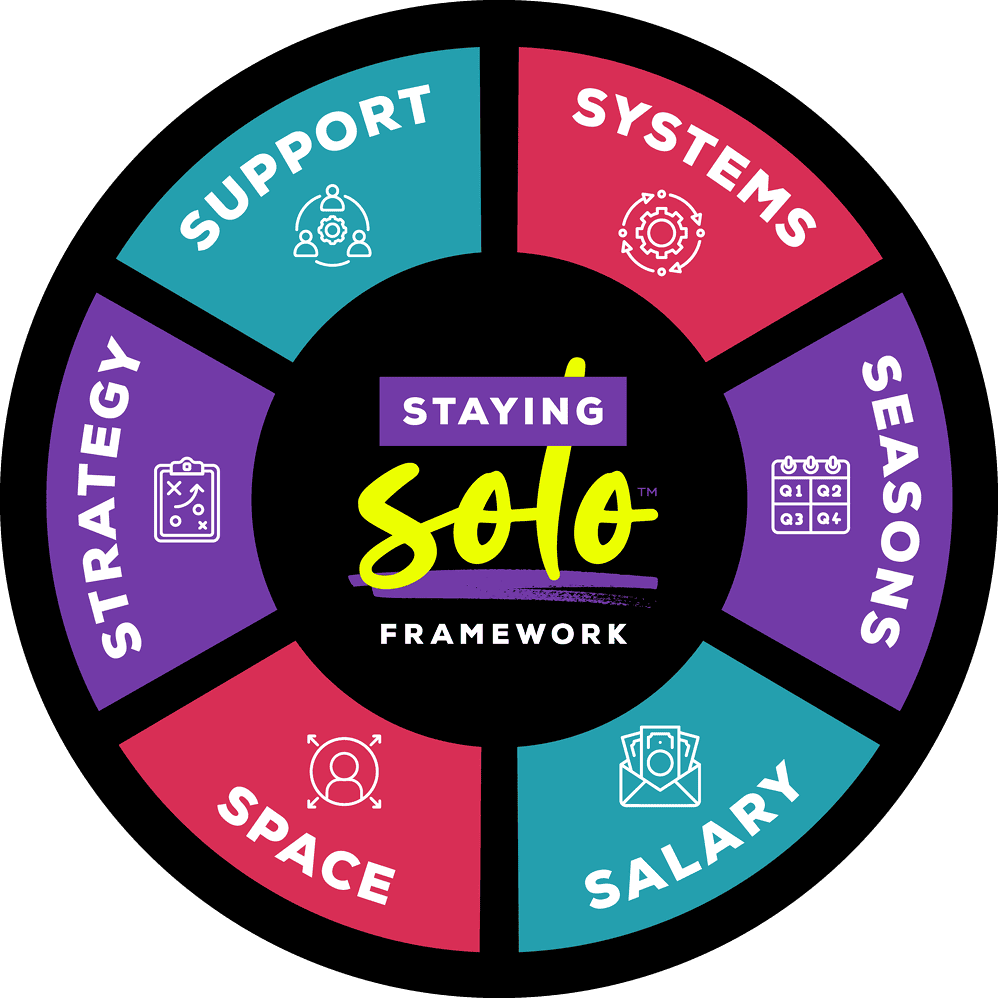
These are the six areas that make a crucial difference when building a service business as a team of one that’s truly sustainable.
Salary: Getting You Paid
You started your business to make money, so your paycheck should be a top priority. Not paying yourself is NOT an option, and too many solo business owners end up shortchanged (or not paid at all) because they get caught up in overinvesting in the business or pricing their services too low.
Space: Creating Capacity
You need to create some breathing room to stay solo without running yourself ragged. This means working on your business, not just in it, and giving yourself breaks away from the grind.
Capacity isn’t about time management; it’s about boundaries and managing your capacity because your time, energy, and emotional bandwidth are limited.
Strategy: Breaking the Income Ceiling
As a solo business owner, hitting an income ceiling can be frustrating and make you think you need to start an agency or sell a course.
Pricing is a factor in breaking that ceiling, but the real game-changer is your strategy. This means not just how you sell to clients (which helps you charge more and look like the expert you are) but also your overall business game plan.
Systems: Ditching Busywork
As a one-person team, you’ve got to find ways to make the most of your time and ditch the busy work.
Simple systems (that you’ll actually use) for your marketing, sales, and service are a game-changer. The trick is to avoid overcomplicating things—just stick to the must-have steps, tools, and templates that keep you rolling smoothly.
Seasons: Planning Practically
One of the big perks of starting your own business is flexibility, but it’s easy to get caught up in nonstop hustling when you’re solo. Embrace your life and business’s natural cycles instead of sticking to arbitrary calendar dates. By planning practically, you’ll create a planning process that actually works for you, giving you the freedom and balance you were aiming for from the start.
Support: Gathering Your Squad
Being a solo business owner doesn’t mean you’re on your own. You’re there for your clients, but you need backup too.
Support can come from professionals who help with your business (or life), coaching or consulting, and a community of people who really get what you’re going through. Having the right support at the right time can make a critical difference in your business journey.
If you want support with everything I’ve talked about in this episode, you’ll want to check out the Staying Solo Squad. We’re open for new members starting right, and we start August 1st!
Join the Staying Solo Squad
When I created this group last fall, it was an experiment, but I have to tell you, this group has turned out to be more than I could have expected. I could brag about it, but I’d rather share what an actual member of the Squad said.
“I so appreciate the input of my peers inside of The Squad. It’s great to get feedback on what I’m working on, and what I’m struggling with, and to have them cheer alongside me for any wins I’ve experienced during our time together. I loved that we’re all meeting together as peers with likeminded goals who are willing to cheer each other on, support each other, and offer respectful feedback when requested”
– Erin Ollila, SEO Copywriter, Host of the Talk Copy to Me Podcast
If you’re an experienced service business owner who wants to stay solo, and wants support from me and the entire Squad this Fall, this is your invite to join us.
Remember, you’re not playing small; you’ve made a choice to run a strategically small business that works for you and your life. Bigger isn’t always better.

I’m Maggie Patterson (she/her), and services businesses are my business.
I have 20+ years of experience with client services, am a consultant for agency owners, creatives, and consultants, and vocal advocate for humane business practices rooted in empathy, respect, and trust.
Read or Listen to the Latest
For Solo Business Owners

Growing a solo service business is tough.
It’s even harder when you’re bombarded with BS advice that steers you away from your values and why you started your business in the first place.
This is the podcast for solo creatives and consultants who want to remain as a team of one and have zero interest in the hustle and grind of typical business teachings.
Subscribe now and never miss an episode.
For Micro Agency Owners
Most podcasts for agency owners obsess over revenue growth as the ultimate success metric.

But here’s the truth: not everyone wants to make millions. Your goal might be to build a sustainable business that lets you have a life and doesn’t run you into the ground.
Join me as I spill my shameless confessions and share everything I’ve learned about building a micro agency that skips the BS of tired and typical agency teachings.
Follow Now on All Major Podcast Platforms

